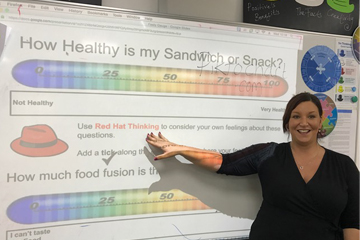Since each and every school has its own unique educational philosophy or approach to educating children, our aim is to shine the spotlight on the different faces of education across Dubai through our monthly Featured School. In this way, parents can better recognise the type of school that will fit their child or family.
I visited Uptown School in Mirdif last week and had the opportunity to tour the school, visit with staff and students as well as interview the Principal, Mr. Christopher Bromham. This school is a full IB school and offers Pre-K to Grade 12. If you were to ask me how I could sum-up the school and its ethos after visiting, I would say three words stand out in my mind: international, enthusiasm and community. Let me tell you why.
It was clear that Uptown School is a true international school. The student body is very diverse and the teachers also represent varied nationalities. One of the school librarians, a native German and fluent bilingual, happily showed me around the library and pointed out their collection of multilingual books representing other cultures and languages. She explained how the school encouraged children to read, not only in English but in their home languages as well. This really fit with the philosophy of the IB where languages and cultures are valued alongside English academic learning.
As I toured the school and had an opportunity to speak to students and staff, I was impressed with the enthusiasm they shared for learning. This could be seen in the attractive displays of student work inside and outside the classrooms. As an educator, this is a very important priority in any school and indicates whether the students’ learning is valued and celebrated. Students’ work samples (e.g. pieces of writing, projects, etc.) are like artefacts that represent their knowledge and understanding of different concepts. At Uptown, there were plenty of high-quality student work samples to view. Examining student work more closely, I could see that the learning going on was complex, thoughtful and creative and that students were highly-engaged in their learning activities. Typically, this is a sign that students are motivated and enjoying the learning processes.
As I moved through the school, I observed students learning in one form or another. In one class, students were making masks based on a character in a Shakespeare play;
in another, the Art teacher was asking students to reflect on the aspects of the artist, Kandinsky’s, personal style. In one of the primary classes, I arrived and the teacher had already set out a task for the students to work on. The students were encouraged to work independently, in partners or in groups. Given this choice, some students worked at their desks, some in different places around the classroom and others sat together in a learning space outside in the corridor. These students got started on their tasks quickly and they seemed confident in knowing exactly what to do. The teacher moved around from student-to-student, observing and monitoring, taking on more of the ‘facilitator’ role that is very common in IB schools. In one of the secondary maths classes, the students were having a test so we moved on. Although some people believe that IB doesn’t use tests or more formal assessments, this is not always accurate. Teachers are trained to use a wide variety of assessment types to understand how students learn and to help them see how they learn as well. Sometimes assessment can include a test or quiz to check on students’ mastery of concepts.
Grade 10 students brainstormed and analysed ‘character traits’ from the literature they were studying. They used strong vocabulary words to express their descriptions and evidence. Then, they created masks of their characters.
In the primary school, students applied their knowledge about the environment, species and natural resources to their project-work. They were required to apply the information they’d already learnt by extending their knowledge to make an imaginary planet complete with different creatures, a natural environment and resources. This allowed students to demonstrate a much deeper level of thinking and learning as compared to fact-based learning.
I enjoyed seeing that student learning and engagement was high throughout the school. In another area, I happened to meet with a group of students and their teacher who had just finished an interesting lesson in Design Technology (DT). The teacher was a little disappointed that I’d just missed the lesson but she and her students were excited to share with me what they’d been learning. It was greeat to see a teacher showing such a high level of enthusiasm and passion for her subject and students! In this lesson, she had asked students to use the ‘Thinking Hats’ approach to encourage them to think in different ways about an issue. In this case it was related to ‘healthy eating’ and students had to analyze their snacks and then sandwiches against different criteria . Giving students opportunities to stretch their thinking outside-the-box and away from just the ‘right answer’ really allows them to think critically and creatively. Students need to reflect on how they are feeling about an issue, they need to understand the issues clearly and apply different kinds of solutions to problems. At its core, the IB is meant to challenge students in this way to encourage ‘thinkers’ and ‘problem-solvers’ through different kinds of learning activities. Students who are experienced ‘thinkers’ are better prepared for all kinds of challenges.
When I sat down with the school Principal, Mr. Chris Bromham, I could immediately feel his passion for the IB and his work. Having experience in both the British and IB systems previously, he was able to give a lot of insight about the IB philosophy and why he felt it was an outstanding choice for many students, especially when it came to for preparing secondary students for their university studies. He also spoke about the sense of community and family that the school had worked to cultivate and how this contributed positively to the staff and students who were like a family.
There was a genuine ‘open’ and ‘welcoming’ attitude at the school. Talking to the Principal, it was something that extended across to different kinds of learners, students from different language (and cultural) backgrounds and students who had come from different schools previously and may not have fit into different systems.
Watch my interview with the Principal of Uptown School, Mr. Chris Bromham HERE and check out our sketchnote with some of the key take-aways from our discussion below:
Who Might Uptown School Appeal to?
• Families who already know about and like the IB philosophy
• Families who have had positive experiences with Montessori or Reggio Emelia nursery schools and want to continue in a school with a similar educational approach
• Families who move around from country-to-country frequently (and may need some consistency in the education system)
• Mixed-culture families or international families who want their chosen school to reflect the values of internationalism and the celebration of different cultures
• Students who come from language backgrounds other than English
• Students who thrive with more freedom for thinking differently or those students who like to explore their topics more deeply
UPTOWN SCHOOL is a Taaleem school and is based in Mirdif, Dubai. It is a full IB school running all 3 programmes: PYP, MYP and DP. The school offers Pre-K to Grade 12. For more information about Uptown School, get in touch with the admissions office by email: This email address is being protected from spambots. You need JavaScript enabled to view it. or call +971 4 251 5001. Visit the school website at www.uptownschool.ae
In the News
















